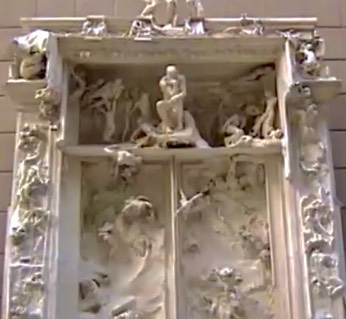The Gates of Hell
Plaster Caste of Auguste Rodin’s sculpture in the D’Orsay Museum, Paris, France. (Original Iron Caste found at Rodin’s Museuml, Paris. France. Photo: JAC
Hell is mentioned, but it is not in explained in any detailed way by the historic Apostle’s and Nicene’ Creeds of the Christian church. However, the doctrine of hell as a place of eternal (sometimes thought of as everlasting) judgment for the unbelievers following the final judgment/verdict is a widely held teaching in Protestant Christianity.
final judgment/verdict is a widely held teaching in Protestant Christianity.
How does one reconcile the eternal conscious separation from God that would come after judgement and involve, it is alleged, what amounts to eternal torture with the goodness of God?
Some Christians have argued along the lines that: 1) rejection of Christ is an eternal and unforgivable sin; or 2) that even if rejection of Christ is NOT an eternal sin, that those who suffer for eternity do so because after going to hell they continue to sin and therefore justice demands they be punished for that, too, ad infinitum.
In defense of #1 it is argued that to reject the suffering servant--Jesus Christ--God’s representative and God’s only atonement for sin, when that offense is properly understood one should just see it as a sin of such magnitude that it deserves eternal punishment and, if you will, eternal torture. In defense of #2 it is argued that if it is accepted for the sake of argument that any kind of sin in itself nor cumulatively added together amount to more than a finite amount of sin--and thus worthy of a finite amount of punishment--the person so judged into hell will continue to commit sins in hell (as they have on earth) and therefore justice demands their punishment be on-going.
Other Christians have argued, that despite judgment and punishment, that 3) second chances and even more if need be will be offered after initial judgement to exit hell (or purgatory) and enter into eternal fellowship with God, presumably guided under certain circumstances and dictated by mercy and justice of God. (Many Catholics hold this view.)
Or, 4) after finite punishment, if God does not allow for second chances, or if He does and the person refuses it, they would be “annihilated.” That is, the “second death” would be identical to how atheists view physical death--final death or annihilation being the ceasing of the person’s existence. Persons who for one reason or another reject God’s grace and mercy even after second chances, will cease to exist--in that sense an eternal punishment, but without eternal torture.
In defense of #3 it is argued that since it is an obvious fact that people do not get fair chances to accept or reject Christ in this life, that justice (and mercy) demands that they be given further chances after death to be redeemed (cf. 1 Peter 3: 18-20 & 1 Peter 4:6). In defense of #4 it has been argued that annihilation is an eternal judgement and that it is hinted at in Revelation 20: 11-15, when it speaks of death and Hades being thrown into the lake of fire, presumably to be annihilated.
Resources on this part of the site are intended to help you look at these issues in order to better prepare an answer to those who question whether the doctrine of hell as it is sometimes conceived is logically consistent with God’s infinite justice and mercy and is scripturally supported.